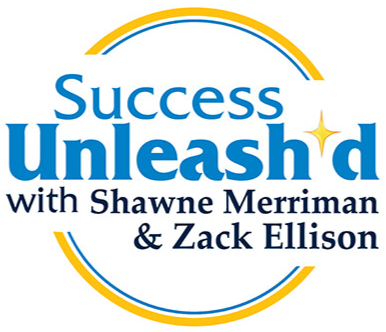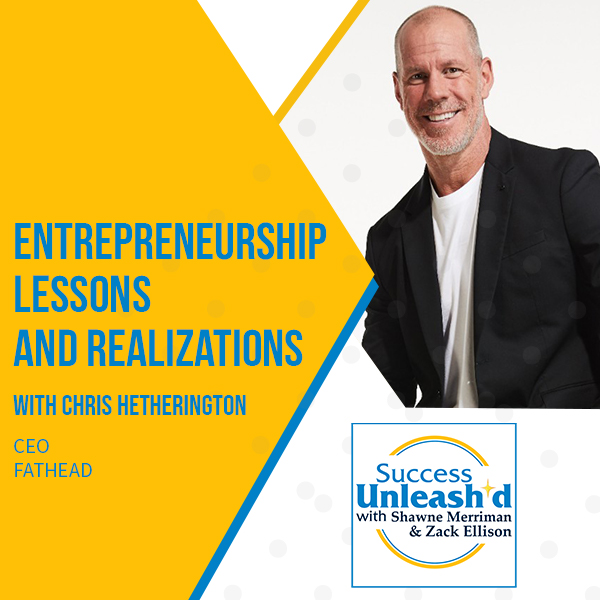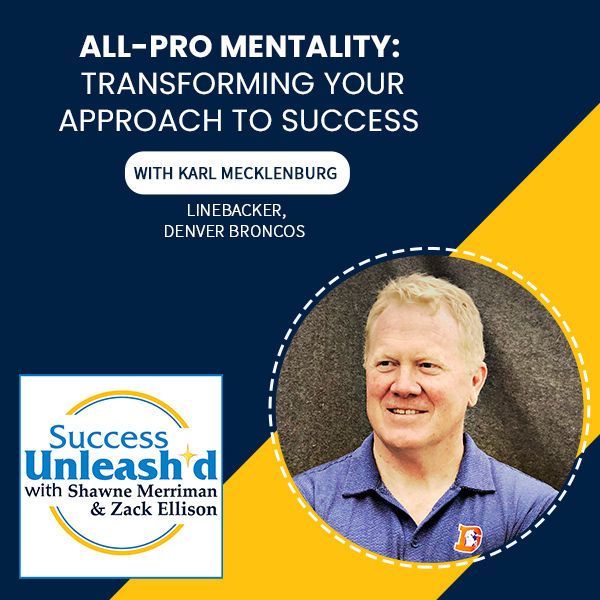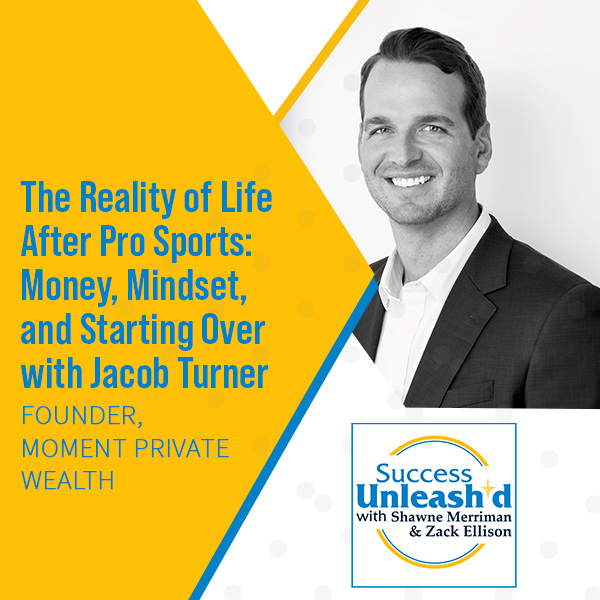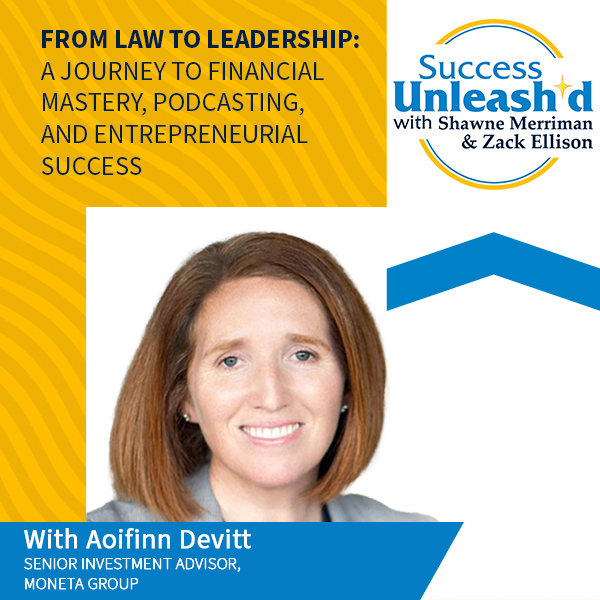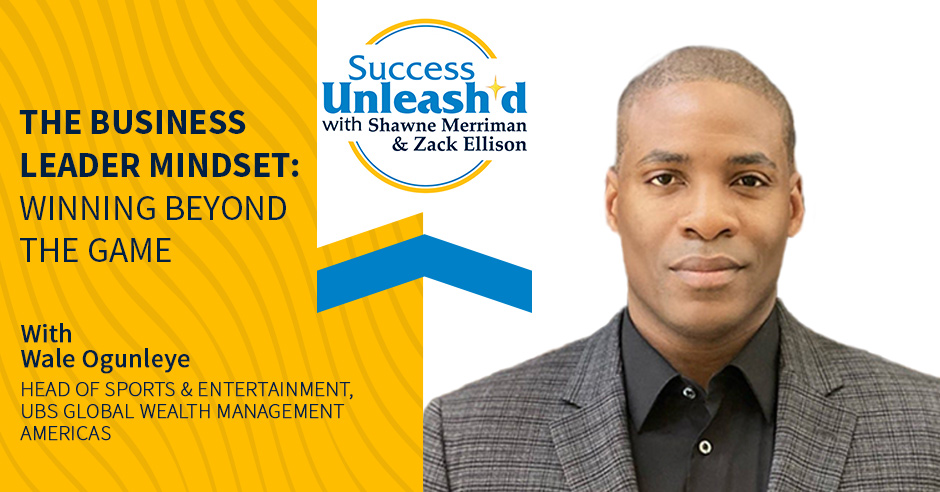
In this power-packed episode of Success Unleash’d, hosts Shawne Merriman and Zack Ellison sit down with former NFL star turned business leader, Wale Ogunleye. From dominating on the field to leading as Head of Sports & Entertainment at UBS Global Wealth Management Americas, Wale shares his incredible journey of resilience, financial transformation, and leadership. This episode dives deep into overcoming adversity, transitioning careers, and applying elite athletic discipline to business success. Get ready for actionable insights on navigating high-performance environments and mastering the art of long-term success!
Success Unleash’d Principles From This Episode
1. Your Background Doesn’t Define You – Your Actions Do
Wale grew up in humble beginnings but used his drive and determination to carve out his own success. No matter where you start, consistent effort and resilience determine your future.
2. Plant Seeds Early for Future Opportunities
Networking and relationship-building shouldn’t start when you need something. Wale attended financial meetups and industry events as a player, setting himself up for success post-NFL.
3. Be Coachable & Embrace Feedback
Athletes succeed because they take direction, adjust, and improve. In business, the same principle applies—be open to learning and adapting to new challenges.
4. Discipline Creates Long-Term Success
From early-morning workouts to high-pressure game days, elite athletes develop unmatched discipline. Applying this work ethic in business ensures sustained success.
5. Always Show Up – Punctuality & Reliability Matter
Whether in sports or business, being on time and prepared sets you apart. As Wale and Shawne emphasize, success comes to those who consistently show up and deliver.
6. Learn the Language of Money
Wale realized too late in his playing career that he didn’t fully understand his finances. He corrected that by getting his MBA—showing that financial literacy is a must for long-term wealth.
7. Hard Work Beats Talent When Talent Doesn’t Work Hard
The best athletes aren’t just skilled—they outwork everyone else. In business, talent alone won’t keep you at the top—relentless effort does.
8. Surround Yourself with the Right People
Wale emphasizes the importance of having mentors, advisors, and teammates who push you to grow. Who you surround yourself with directly impacts your trajectory.
9. Be Proactive, Not Just Reactive
Waiting for direction won’t get you ahead. Wale and Shawne stress the value of taking initiative, bringing fresh ideas, and consistently adding value.
10. Success is a Mindset, Not Just an Outcome
Whether in football, finance, or entrepreneurship, success isn’t just about results—it’s about building the right habits, maintaining discipline, and staying motivated for the long run.
—
Watch the Episode Here
Listen to the Podcast Here
The Business Leader Mindset: Winning Beyond The Game With Wale Ogunleye
We have with us Wale Ogunleye, who is the Head of Sports and Entertainment at Global Wealth Management Americas at UBS. Wale, thanks a lot for joining.
Thanks for having me. I appreciate it.
You and Shawne know each other well and go way back. A lot of people don’t necessarily know your story. They know you from your NFL days. You’ve been incredibly successful in business. In this episode, we’re going to talk a lot about how you went from being successful on the field to being successful off the field. Between you and Shawne, we’ve got two of the best post-NFL business leaders of our time. I’m excited to have you on.
Shawne is a legend in this. We went to business school together, so we learned some of the tricks in the same places. It’s been fun to watch him grow and become the mogul that he has become.
Wale Ogunleye’s Humble Beginnings And Entrepreneurial Journey
Wale, one of the things that impressed me about you was the humble beginnings you came from. That’s the same for Shawne and I both and many of the people we bring on the show. I always respect people who started with not a lot and then built it themselves. I’m impressed with your story. Talk a little bit about your upbringing and then take us through how you got here.
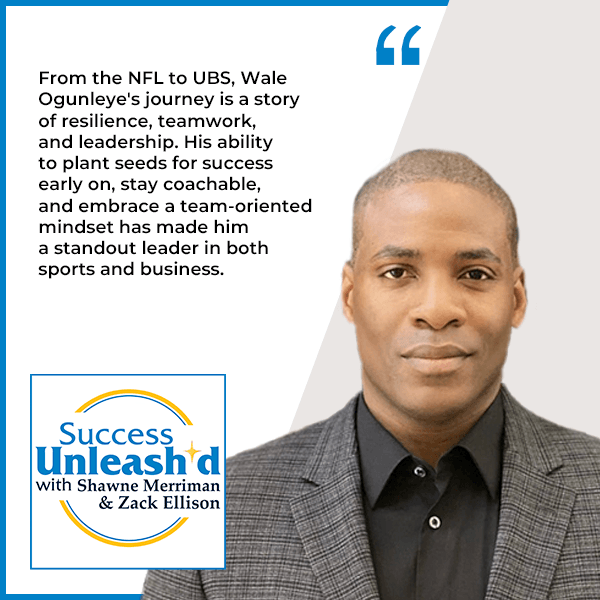
I’m proud of my upbringing. I was born in New York City. Both my parents were immigrants to the United States. They came here from Nigeria to get their education. They wound up having a couple of kids while they were here at school. The American dream was getting a degree, a job, a nice house, and a picket fence. We started in the projects in New York City, trying to make ends meet with 2 parents and 4 kids.
The great thing about my story is that my parents weren’t big fans of football at all. They could care less about the sport. They thought it was a very barbaric sport. Being from Nigeria, soccer was the sport of choice for them. Once my high school coach told them there was a chance that I could get a scholarship to go to a university, they became the biggest cheerleaders you’ll ever see in football. They had the biggest pom-poms because they still had big student debt at the time and they were still paying off their degrees.
From playing well in high school, I got a degree at Indiana University. I played there for four years. I was a three-time Big Ten player at Indiana University. We weren’t good at football like we are now, but I played extremely well. It was a preseason all-American my senior year. I wound up tearing my ACL, went as an undrafted free agent, and then turned that into an eleven-year career. In the middle of that, I wound up signing the biggest contract for a restricted free agent at the time.
Throughout my life, I’ve had opportunities where I had some adversity. Growing up in New York City during the crack epidemic wasn’t the best time for a kid to grow up. After getting to Indiana University and tearing my ACL, I still found a way to make it to the NFL and turned it into an eleven-year career. I’m blessed that I’m sitting at this place where I’m at UBS.
I look back at my time in the NFL. Towards the end of my career, I realized that the light at the end of the tunnel was coming. I didn’t understand my finances as well as I should. I was investing with people who talked the language that I talked but didn’t understand the financial landscape. That’s why I went back to get my MBA. The NFL has a great program where that helped supplement some of your continued education. That’s where I bumped into a good buddy Shawne Merriman at GW in D.C., his stomping grounds.
I wanted to learn about my finances, how I could use the assets that I attained the right way, and how I could have the right conversations, build a business plan, and understand what an ROI is. It was a good two years that we spent there. From that aspect, I still had a desire to give back. I bumped into the Head of Private Wealth at UBS and told them a little bit about my story and how I appreciated the way they treated me as a client. He looked at me as a businessman, not as an athlete, and I appreciate that approach.
To be fair, being from New York City, it was weird that I didn’t know anything about UBS. One out of every two billionaires has an account or a relationship with our bank. The fact that I’m this multimillionaire in the NFL and I know nothing about UBS shows why NFL players and athletes probably need to do a better job of surrounding themselves with the right people when it comes to their finances.
Athletes need to do a better job of surrounding themselves with the right people when it comes to their finances. Share on XWith that being said, UBS decided to create this division where I’m the head of this division, but more importantly, what I’m able to do is take all of the departments within UBS and get them out of their silos. We have an umbrella department in the sports entertainment division where we look holistically at how the firm should work with not only our billionaire clients but also our athletes and individuals like myself.
It’s been fun. Of all our competitors, I might be the only person who sits in my seat as a former player who is not officially a financial advisor but a general managing director, helping move the needle and create solutions for our clients. I was a little long-winded there, but you asked for the story of how we got here. That’s how we’re here.
I want to jump in. Even before we met up and started a friendship, I remember all the NFL events and the different financial meetups. I remember seeing you at all of this stuff before we started to hang out. I would run into you or I would see you across the room all the time. The seeds were planted a lot. Can you talk a little bit about planting those seeds as a player to set yourself up? Even though we didn’t have a formal friendship yet, I remember seeing you at all those events, whether it was financial meetups or whether the PA was having something. I always see you there. Can you talk a little bit about the seed planted around that time?
There’s an East Coast bias with a lot of NFL players and a lot of people. The fact that we were raised in the Northeast, we had a little bit more of a hustler mentality where we would show up at every single thing to meet people. Sometimes, we want to be introverted, but because of the position that we played in the NFL, we had to figure out how to make sure we get in front of people, hand out business cards, or get business cards because we always knew at the end of the day that football wasn’t going to last forever.
Seeing you at these meetings was where we were planting the seeds, not knowing where we were going to wind up. I don’t know if you knew eventually you were going to be the media mogul that you are, but I know for sure I didn’t know I was going to wind up at UBS as the Head of Sports and Entertainment. What I do know is that going to these meetings planted the seeds for success in any area of the industry that we wanted to go in. The fact that we had a sports background where we’re teammates, we’re athletes, we’re coachable, and we’re team-orientated, those little things help us in corporate America. That’s why you see a lot of former athletes who are doing extremely well if they put their minds to it within the Corporate America space.
I agree 100% that athletes can often make the best employees and the best business builders because they have all these intangibles, but they also have training, like being coachable and being told what to do and not necessarily revolting against it but being able to take that feedback. I played basketball, not at the level that you guys played at but I had many different coaches. Sometimes, they gave you constructive feedback, and other times, you wanted to flush it down the toilet but you still had to do something with it. That’s how it is in the real world.
That’s how it is on Wall Street where I worked for over a decade. When I was on the trading floor at Deutsche Bank, and this was back when we were the biggest bank in the world, even bigger than UBS, we loved athletes. That’s why they liked me because I wasn’t a pro athlete but I had all the intangibles. They like that because you get there early, stay late, work hard, and understand what it means to support the rest of the team, even when that means doing the dirty work.
Valuable Success Lessons From Athletes
In the NFL, you’re carrying guys’ bags. On the trading floor, you’re getting them breakfast sandwiches at 6:30 and printing out their newspapers. It’s no different. It’s the same stuff packaged slightly differently. A question for both of you guys is let’s say you weren’t a pro athlete. You see how athletes in general are successful more often than others, in many cases. What can we learn from what athletes do that any person off the street could apply to their lives? Wale, why don’t you start? I’d love to hear what Shawne thinks, too.
You hit a nail on the head. I see it all the time with the younger colleagues around me. There’s a different work ethic in the younger generation. They don’t want to put the time in. I was a Pro Bowl player but I was the youngest person in the room so I still had to get the sandwiches and the towels. I still had to get all of the things the veterans were not going to get. I appreciate that approach. I was one of the best players on the team but I was one of the youngest players on the team. I still had to do those rookie-type tasks because I was the youngest person.
I see that the younger generation doesn’t want to put the time in. They want to get the raises. They want to get promotions without having to put the time in. Look at the way a lot of athletes put the time in. They’re very successful. You may see the outcome on Sunday or if you are a basketball player on any day you may watch them on whatever channel you watch basketball, but the truth of the matter is they put the time in years, months, or weeks in advance before that game showed up on Sunday. That’s what I would love the average person who’s coming into Corporate America to realize. You’ve got to put the time in. Eventually, that time, hard work, and dedication will pay off for you.
I want to say something about that. Zack, you hear me say this all the time. The athletes are the most disciplined people on the planet Earth. Since 11 or 12 years old, we had to show up at practice on time. We were told when to go eat and study hall. The rest of the students in college, after they get done with class, can go hang out and get their work done and they’re fine. We had class checkers. If we missed class, we were running stadium stairs. It was nonstop of you having to do something. Over time, you build up this regimen where that’s all you know.
For me personally, making that transition out here into the real world and showing up 5 minutes or 10 minutes earlier to everything that I was doing was so common because if we didn’t do it, we were going to get fined. We were going to have to run or something. There would have been a consequence of it. That’s the first part of it.
Two, it’s such a performance-based business that if you didn’t perform, you were out the door. Not only were you out the door, they would draft somebody, put them two lockers down from you, and then tell you, “As soon as you don’t perform, these guys are right here to take your position.” When you develop this mentality as an athlete, you take that to the real world. Every single day you wake up, there’s a competition because you know that there’s somebody right behind you who wants to take your job.
I agree. To add to that, if you’re a veteran, you’re almost even asked to bring that young person in who’s supposed to replace you. You’re supposed to teach them the ropes. It is a crazy situation where your replacement is right in front of you and you have to make sure you teach them the ropes but then still beat them out every single time.
Every year I was in the NFL, each team that I was on drafted a defensive end, 2nd round, 3rd round, or maybe 1st round. I had to beat that person out every single time. It is a weird environment but it does prepare us again for the next stage in life, knowing that nothing comes easy and nothing’s guaranteed. You have to keep working every single year.
Nothing comes easy, and nothing is guaranteed. You have to keep working every single year. Share on XOne of the things that always impressed me about Shawne from the time I met him years ago is that he always is on time. I don’t think he’s ever missed a meeting. That blows my mind because I have people missing meetings all the time and they’re like, “Something came up,” or, “My meeting ran late,” or whatever excuse it is of the day.
It’s crazy because that causes so much inefficiency because it cascades. When you miss a meeting, it gets pushed back a week, so then you’ve missed all this other stuff. It gets pushed back more. Before you know it, you’re months behind because you missed that one meeting, or you’re ten minutes late so you missed the key pieces of it.
I used to give this advice to a lot of younger folks who worked with me when I was at some of the bigger firms I worked at like Deutsche Bank, Sun Life, and some others. I would say, “The biggest thing you can do that’s easy is to show up on time with a good attitude and work hard.” It’s that simple when you’re young. Show up on time, have a great attitude, and work hard. If you do that, that’s probably 90% of your success. How can you not like somebody who’s doing that if you’re their boss or if you’re their teammate? It’s easy, but in spite of it being easy, very few people do it.
I agree with you on that. The mentality of showing up and having a good attitude goes such a long way. It is a science that is being lost on the younger generation. I don’t want to be one of the OGs that’s harping on the good old times but I do see that there is a lack of work ethic and having a good mental state as you walk through those doors every day. I want us to get back to that.
Adapting Leadership To Younger Generations
Off of that, for me, I never wanted to be the old guy. You hear some of these older football players say, “Back in the day, we had leather helmets. We played with no teeth.” You’re trying to dab into today’s time because everybody reacts differently. When you’re working with these younger generational kids in a way that they are coming out, how do you adapt to get them to stay motivated and get things done?
I love Marty Schottenheimer. I love the hard coaches. We can take it. Whatever they said and whatever they did, we responded. I see that when I’m hiring and bringing these younger guys in and I get on with them a little bit and try to motivate them in a different way, some of them can’t take it. How are you able to adjust the coaching styles and how things have shifted to how it is now?
Ultimately, we have to tone it down a bit. We grew up in the Bob Knight era. That’s not happening anymore. We have to adjust the way we communicate and talk in a way that they can receive the message. It is extremely hard to do. Leading by example is probably the best way to lead these young individuals. It is understanding, “I know you think this is a 9:00 to 5:00 job but that’s not the way the world works. You don’t clock in at 9:00 and clock out at 5:00. This is a 24-hour, 7 days a week type of mentality that you have to get better.”
Leading an example of being the individuals that are going to roll their sleeves up and get dirty will show them the way that you want them to work. When the time comes for bonuses and promotions, you can point back to those moments where you’re like, “I had to show you how to be more of a better teammate and a better leader because I was in the trenches doing it with you. I had to show you and motivate you.”
For me, leading by example is probably my biggest way of motivating these younger generations in Corporate America. Our old way of getting in their faces and pointing their chests, they don’t receive it well. I see it even with my own kids. I try that and my kids are balled up in a corner crying. I’ve got to figure out a different way to do things the same way that my parents did. I’ll also say this. As I look back at my parents and as strict as they were, they were right with some of the stuff that they did.
Don’t be the person who has to have something terrible happen for you to realize you went the wrong way. Listen to the old heads or the OGs. They’ve been through it. I know it’s easier said than done, but I look back and those older people who talk to me cared. That’s the same thing that goes with coaching. If your coach is not talking to you, he’s already given up. I hope that the people that we work with understand that if we talk to you, that means we care and we want you to be successful. In this new age, I try to lead by example and hopefully, they understand that I do care about them.
Key Skills For A UBS Career
This is a question for both of you guys. Let’s start with UBS. If a college student wanted to work at UBS, what are the skills and, more importantly, the attributes, like the intangibles, that you would want to see in the perfect hire?
They’ve got to be on time. They’ve got to be hardworking. They’ve got to ask what’s next. They’ve got to be persistent. I know too many times you give someone a task and they do the bare minimum. They won’t email me or ping me until I have something else for them to do. Be a go-getter. Another thing, too, is to have some initiative. Bring some ideas to me.
I am an old head. In a certain way, I do need younger, fresh ways of thinking about it. Find a way to articulate that to me. I know I’m all over the place, but I do want to have people around me who are go-getters and are self-motivating but at the same time can articulate the way they see life and say, “Maybe we should try a different direction.”
My word for that is proactive. I got to work with somebody that’s coming in proactively. I’d rather them come in and do something and I got to say, “Don’t do that,” as opposed to telling them what to do every single time. Be reactive when something goes wrong. I’ll give a prime example. I hired young social media teams. I’m coaching them through every single part being on the digital side of what to do. I said, “If I have to spend this much time telling you what to do, I might as well do it myself.”
When you’re young, you come in hungry and be proactive. I can work with those two things because in you being proactive, I can at least step in and say, “I see where you were going with this but this is the way to do it.” When you don’t do anything and you’re doing the bare minimum to get by to say you did something, then I can’t work with you from that standpoint.
There are a lot of things that you’re going to learn. I’ve been doing a lot of this stuff for almost twenty years back when I started doing Lights Out Clothing and trying to figure out ideas. When I started, I didn’t do everything correctly, but I did it. I did something. Later on, I got a coach to do it. It is being proactive and being willing to take coaching.
Those are great points. I would add playing to whatever strength. To Wale’s point, you’ve got these younger people who understand technology, social media, and consumer trends in a way that we maybe don’t because we’re older and we’re not focused on that day-to-day. I always advise younger people to do everything that you guys said and we talked about earlier. That’s blocking and tackling in a sense.
Figure out what it is that you do that’s a little bit unique that your team doesn’t do or that your boss or organization needs and push on that. Be a star in that one little area, even if it’s making good 30-second social media clips. If you can do that better than anybody, you’ve got a place on the digital marketing team. If you’re a good writer, focus on that. Whatever it is, there’s always something that you have. You have to identify what that is.
When I used to play basketball, you’d have a guy who wasn’t a good shooter but he’d be launching jump shots behind the three-point line. It’s like, “Stop shooting. Stop, please,” or they’re going to the hoop and they’re converting 30% of the time because they’re not good at taking it to the rim. I feel like it’s the same way in business. Figure out what you’re good at and, to some extent, stay in your lane initially.
The great Marty Schottenheimer told me this and this stuck with me for my entire life. After I was done, I applied it all the time. Sometimes, your best ability is your availability. I’ll give a prime example. I hired younger kids who are coming in and are trying to figure things out. I’ll hit them on a random Wednesday to do something and they’ll be like, “I’ll do it as soon as I get back in.”
I’m like, “Where are you?” They’re like, “I’m at the beach.” At the beach on Wednesday? What’s going on? Maybe they’re taking up Friday off early to go with their family or do this and that. Family is important, but when you’re trying to get yourself off the ground, trying to create a lane for yourself, and trying to make a name for yourself in the industry, those things can’t happen.
One time, I was banged up and I was hurt on and off the field. Marty said, “Shawne, you’re the best player here, but sometimes, the best ability is your availability. You got to be available for the games.” That clicked for me and I never forgot that. It doesn’t matter how good you are at certain things. If you’re not available, that next man is always going to be up. Someone’s going to look at that person who’s always available.
That is a great point. I have the same struggles that Shawne’s going through. The job’s going to get done with or without you. If we find out that we can do it without you, you’re going to be out of here. You have to be available. You have to be attentive. Be early. Be ready to show that you’re a key part of this thing being successful. The moment that we realize that we could do this without you, especially in Corporate America, they’re going to cut bait and go into the next thing. I agree with everything Shawne said.
NFL Lessons Applied To Business Success
I have one question. Any big business, in general, has their downfalls, their knocks, and whatever. I always say this. Playing in the NFL is the closest thing to any corporate job that you can have out of here and probably worse because not only did you have to perform and do everything else, but you had to understand the business. Sometimes, you get cut, traded, released, or waived because they’re trying to save some money. They got some roster moves. There is nothing personal.
The NFL, I look back on it, has helped me to understand so much and have a layer of skin that most people don’t have. Has the NFL done something for you working with UBS now and being there? Have you been able to bring any of that mindset that’s helped you from playing NFL on that platform to what you’re doing now?
It’s the same thing with you. For me, nothing is personal. For most of my career, I was a decent player in the NFL. I was a starter for the majority of the time there. I was able to have conversations with our coaches where if I wasn’t playing well enough, they could tell me. If I was playing well enough, I got paid handsomely for that. I appreciate that approach.
In the NFL, everyone says it’s a dirty game but it is a microcosm of regular society. Corporate America is as bad. Even with Corporate America, the communication is probably even worse than the NFL. You’re not having a coach because of HR who’s going to get in your face and tell you, “You messed up here. You messed up there.” A lot of times in Corporate America, there is a lot of patting on the back that shouldn’t be happening.
The NFL is a microcosm of society. Corporate America is just as bad. Share on XMy hard knocks growth within the NFL got me ready for Corporate America and has gotten my team on the same page that I’m on. I get them into a place where they’ve got to understand, “We have to be successful. Here are our goals. We’re not here just to collect checks. We’re here to make progress and make UBS a better place to work for our clients and our advisors. If you’re not on board, you won’t be here.” That approach from the NFL of being to the point and being like, “We got to figure out what is our Super Bowl. Let’s get to it. If we don’t, there’s got to be some changes,” I brought that mentality with me and it’s been successful over the last couple of years.
How Successful People Stay Motivated After Achievements
What do you do to stay motivated given all that you’ve accomplished?
For me, it goes back to the beginning of our conversation. I know where I came from. I still have this fear, that it can all be taken away one day and I’ll go back to that. I don’t want to go back. I have a beautiful family with beautiful kids. I want to make sure that they have a much better upbringing than I have, which we’ve already been able to do. That has motivated me.
Knowing that my parents came here with no help from anybody and no family and raised a beautiful family in America where all four of their kids are successful, I can’t turn on that part of our history. I’ve got to make sure that I continue to be successful. For me, I’m self-motivated in the sense that I don’t want to go back to the Park Hill projects in New York City. That type of living was not pleasant. For me, that’s what keeps me motivated.
Zack, if you ever noticed, when we talk about growth and all the stuff we’re doing, we start talking about exit and stuff. I try to stay away from anything involving exit or, “I’m out,” or, “I’m done,” because all I know is work. I truly wouldn’t know what else to do if I stopped. It’s so accustomed to me. It’s like somebody wakes up in the morning and they have a cup of coffee. For me, and you know this, Zack, I’m in the gym at 6:00 in the morning. It’s such a regimen 6 or 7 days a week that I don’t know anything else.
You laugh and joke sometimes when we are talking about brokers selling the business or somebody coming to buy the companies and stuff. I try to stay away from it as much as possible because I’m in fear of not being able to work. It’s the only thing I’ve ever known my entire life. My first job was at eleven years old. I was landscaping with my uncle, cutting grass, and raking leaves, yards, and stuff like that. The first yard I ever cut was James Brown’s of Fox Sports in Bethesda, Maryland. That was the first yard that I’d ever cut when I first started working with my uncle. I don’t know anything else.
During the winter, I was shoveling snow. I don’t know if you guys remember the tapes we had. I would take the cassette tapes out and use the plastic thing to go by and scrub the ice off of people’s windows. I was cutting grass during the summer and washing cars. It didn’t matter. For me, it’s all I know. It’s not even a motivation. It’s a part of my day.
It’s no different than somebody getting up and having a cup of coffee in the morning. I get to work. I don’t know if I’d call it motivation. Motivation, for most people, dies down. It’s like you going to a convention and you hear a bunch of rah-rah stuff. You walk out two hours later and you’re not motivated anymore. I’m accustomed to working. That’s all I know.
The real question I have for Shawne on this one is did he tip you well? Was he a good tipper or not?
Yeah, he did tip me well and then I never told my uncle because I wanted to make sure that I didn’t have to split the tip with him. He came out and he saw me cutting the grass. I was trimming the grass in the end because we had the weed whacker and stuff like that. He came out, patted me on the back, and threw me $60 on the side. I never told my uncle to this day that JB did that. I shared that story with JB one time. We did a show together several years ago. It’s been great. All I know is work.
What I take away from that are a couple of things. One is this idea of using adversity as fuel. I’m in the same boat in that I grew up with no money. I was raised by a single mom. My dad’s never been in the picture. A lot of people would use that as an excuse like, “Here’s why I didn’t go to a good school,” or, “Here’s why I couldn’t get the job,” or, “Here’s why I had to do X, Y, and Z.” What we see a lot in society is a lot of excuses. Instead, use any hardship or adversity as straight-up fuel.
I’m motivated like you, Wale, and Shawne. I never want to go back to having no money. I also value autonomy. What motivates me is the ability to express my vision. I could work at any big firm in the world. They used to call me all the time. They stopped calling because they knew I was not going there. They’re like, “Do you want to be a partner here or there?” I’m like, “I have no interest. They’re shocked. They’re like, “Why would you not want to be a partner here?” I’m like, “It’s because I have no interest in being part of a bureaucracy where I can’t express my best self.” It’s like playing in the wrong system in football, for instance. You have to get into the right system.
I always advise people. Find out what you’re best at but then find the team and the environment that fits your skillset. If you don’t have the right environment and you’re not doing the right thing, it’s never going to work if you’re not a fit. If you’re entrepreneurial and you need to have autonomy, you want to express new views, and you want to be innovative, then do not go work for a big company because straight-up, they’re going to squash that. If you’re very concerned about consistency and you want to have a nice, comfortable life, there are plenty of big companies that will pay you handsomely. Everybody’s got to pick what’s right for them.
Shawne is an entrepreneur and a media mogul. That works for him. He kills it because he has these skills that make him good at being a leader, a founder, and a business builder. He texts me every day at 6:30 in the morning Eastern and he’s on the West Coast. I’m like, “What time do you get up?” He’s working out at the gym at 7:00 AM at the latest. He’s usually wrapping up his workout at 7:00 AM Pacific. That wouldn’t necessarily be the right mentality for a slow-moving big firm. It upsets the apple cart.
I’ve worked at a firm like that that I won’t name because I don’t want to bash them. It was so tough for me to work for them because I felt like a horse that was being pulled back all the time. They would never let me run. Now that I can run, people see what I can do and they’re like, “We want you on our team now. We’ll pay 10X what we paid you before.” I’m like, “I was there. You could have done it but you didn’t.” Yesterday’s price is not today’s price, as Fat Joe would say.
When Shawne was at the NFL Network, they started that AM show which starts at 5:00 on the East Coast, Shawne was going from the gym straight to work every 3:00 in the morning on the West Coast and did that for a year. That’s what we talked about earlier, which is having a base of who you are. Those little attributes that are already in people like Shawne are going to be the reasons why no matter what, you can never bet against a guy like him because these are the things that make him successful.
Whether it be in front of the TV or behind the camera, those characteristics that have made him who he is and who made him one of the best players to play the game of football make him one of the best entrepreneurs that has ever played the game. It’s great to see that if you stick to your guns and have a good work ethic, you’re going to be super successful.
If you stick to your guns and have a good work ethic, you’re going to be super successful. Share on XIt’s been awesome having you on.
I appreciate that. This has been great. We’ll catch up, too. You don’t get out as much anymore, but I’ll still hit it once in a while. Zack, I’ll drag him out if I can once in a while.
We can have another episode about that part of it.
Zack, some of those times, I wouldn’t go straight from the gym. I was straight from the club to the NFL to the gym. It was a nice 12 to 14 hours for me. It has been great. I appreciate it.
Thanks for coming on.
Thanks.
It’s been great.
Important Links
- Zack Ellison on LinkedIn
- Zack Ellison on Instagram
- The 7 in 7 Show with Zack Ellison (podcast)
- Applied Real Intelligence (A.R.I.) Website
- Shawne Merriman on LinkedIn
- Shawne Merriman on Instagram
- Lights Out Sports TV Website
- Lights Out Xtreme Fighting Website
- Adewale Ogunleye on LinkedIn
- UBS Sports & Entertainment
- Wale Ogunleye
- Former NFL DE Wale Ogunleye discusses position as head of sports and entertainment at UBS
- Ex-NFL star at UBS keeps players from going broke
About Wale Ogunleye
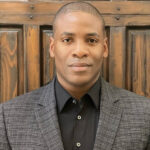 Wale Ogunleye leads the UBS Sports and Entertainment business for Wealth Management USA. As head of the division, Wale draws on his background as a college and professional football player to help Financial Advisors understand and address the needs of athletes and entertainers. The goal of the team is to facilitate holistic advice and planning for these high-profile individuals, and provide Financial Advisors who are focused on this segment with the resources they need to grow their business.
Wale Ogunleye leads the UBS Sports and Entertainment business for Wealth Management USA. As head of the division, Wale draws on his background as a college and professional football player to help Financial Advisors understand and address the needs of athletes and entertainers. The goal of the team is to facilitate holistic advice and planning for these high-profile individuals, and provide Financial Advisors who are focused on this segment with the resources they need to grow their business.
Beyond the game Wale notes that, far too often, we see our favorite athletes or entertainers in the news because they have made poor financial choices or listened to unsound advice. As an NFL player, he had the common experience of being offered a wide variety of financial opportunities without any context for how to evaluate them. After his football career, Wale pursued his interest in business by earning his M.B.A. He joined UBS in order to help make a positive impact on the lives of athletes and entertainers.
Wale is a natural leader who was named Most Valuable Player by the Miami Dolphins in 2004. As the team captain for the Chicago Bears in 2006, he helped them win their conference title and reach Super Bowl XLI. He brings that leadership experience to UBS, working with Financial Advisors to harness the firm’s capabilities on behalf of their sports and entertainment clients. Wale is singularly focused on creating a division that is thoughtful in its approach, rigorous in its planning, grounded in integrity and dedicated to putting clients first. Wale’s goal is simple: to advise every client as if they were the CEO of a multimillion-dollar business. The team will also help student athletes prepare for life after college by educating them about personal financial topics. Empowering and educating others
From his days as a professional athlete to the present, Wale has always made it a priority to support charitable causes and participate in the community. He started the Goal Power Foundation while he was playing for the Chicago Bears. The group helps to expose inner city youth to different careers and opportunities within the sports world. Wale earned his B.A. in English from Indiana University, and his M.B.A. from George Washington University. Wale is the son of immigrant Americans from Nigeria. He is married to Dr. Amira Ogunleye, the owner of two successful dental practices in South Florida. Together they have two children.
